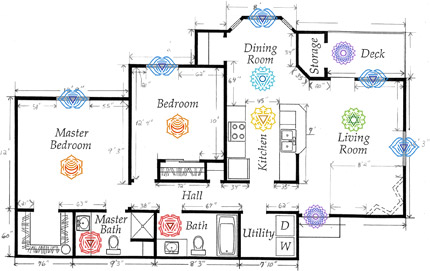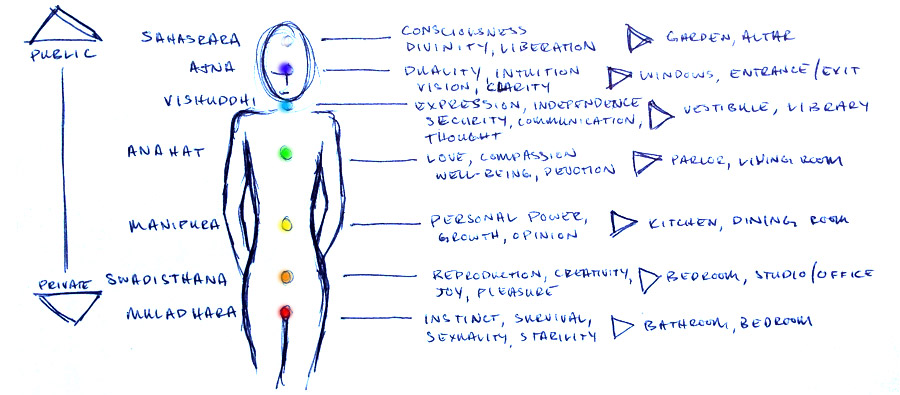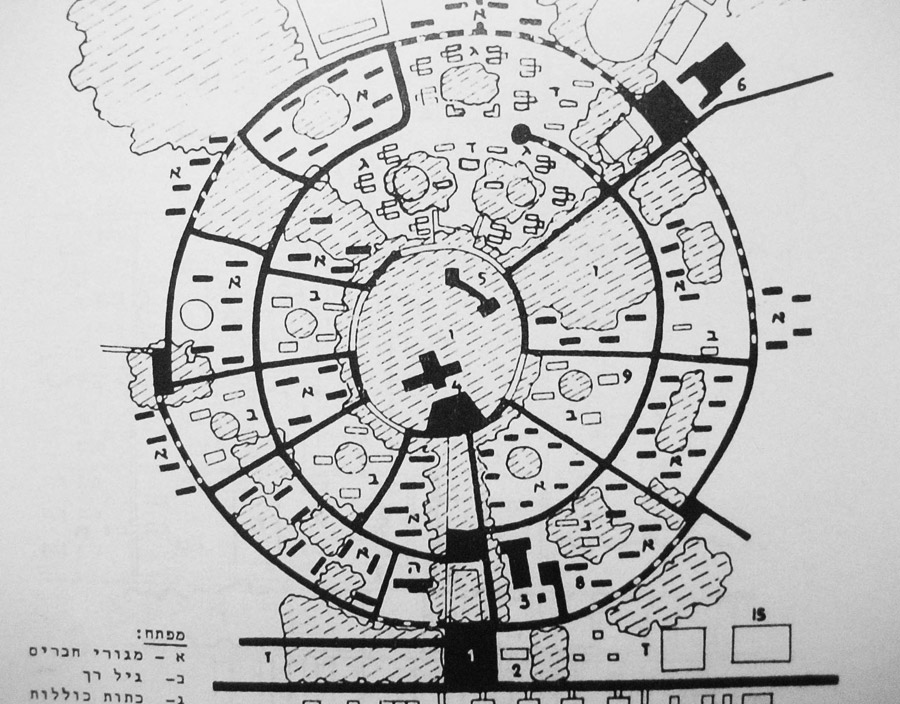 Jung believed that when a person dreams about their home, it’s a direct metaphor for the psyche.[1]
Jung believed that when a person dreams about their home, it’s a direct metaphor for the psyche.[1]
In our waking lives, the home as a reflection of self hardly requires of a jump. Regardless of whether you prefer the terms of Architectural Psychology or Feng Shui, it’s plain across rhetoric and culture that our structures are as much a canvas for expression as they are determinants of our mood, health, and relationships.
I started thinking about the architectural significance of the chakras while living in a house with a dozen other adults. My partner at the time and I had bought the 4-story, 4-unit home with the idea of architecting something more inclusive, supportive and dynamic than the traditional nuclear family. As we worked to create a sense of community in the evolving patchwork of private spaces, public spaces and roommates, I poured over blueprints of schools, hotels and ashrams — while trying to figure out why it just wasn’t working.
Living with anyone can be difficult. I once heard a comedian say that there are two choices: loneliness, or irritation. Most of us in the western industrial world first experience non-familial cohabitation when we are but adolescent maggots blindly feeling our way through relationships, careers and life, and simply too broke NOT to have roommates. Armed with little in our conflict-resolution toolbox, we hobble our way through differences, or throw up our hands to resignedly despise our roommates. So we work hard, earn more money, and eventually move into a half-decent studio or one-bedroom, to more properly begin our next quest: settling down with a romantic partner, maybe to have children, but especially so as not to die alone. And once we do, whether it’s married or living in sin, we receive a shocking reminder: living with anyone can be difficult.
Now, obviously it’s not all bad, or we wouldn’t bother at all. Coming home to a gaggle of roommates watching a movie, or a lover who’s cooked you a meal, or your little one rushing at you with open arms, can be heaven. And it’s hell to clean their hair out of the shower drain, discover someone has eaten all your organic imported chocolate, or be kept up by your neighbors having loud sex the night before your presentation. Depending on the nature of the relationship, some activities are more easily shared than others, some transgressions tolerated more than others.
According to the Vedas, there are 7 types of relationships corresponding to the chakras. Or perhaps better put, our relationships are ruled by certain chakras, some more than others. If our social realities are also ruled by the daily structures we physically inhabit, what is the relationship between architectural space and the chakras? How can our homes be designed to create a socially harmonious flow of energy exchange that bonds and comforts, without crowding or irritating?
The sketch above is a brief summation of the chakras and areas of a typical western home with which I thought they corresponded. I’d be interested to see a cross-cultural chakric breakdown of dwellings, but for now, I can only write from my experience living in the US and Europe.
The progression from the first to last chakra suggests a continuum from highly private, intimate and subjective, to shared, public, and objective. The highest chakras connect us to a great number of beings. The lowest connect us with fewer, in our most intimate relationships. Changing diapers or having sex are things we share with a special few. We’re likely to share a meal more casually – though probably not with just anyone. Books and lectures connect us with a great many, across time and geography. Our spiritual pursuits connect us with everything. Relationships ruled by the lowest chakras require a higher level of trust and shared values than those ruled by the higher chakras.
When I talk to people about communal living, one of the first things they blurt out is that they would need their own bathroom, and sometimes, but less often, kitchen. I noticed while living in a house teaming with other adults, how annoying it could be to share these amenities with others that aren’t intimate familiars or who didn’t share the same values (like cleanliness). Anyone with a toddler knows how messy that first chakra can be, and a private toilet for parents and child is more likely to be comfortable for a budding family and everyone else. Sharing a kitchen is something I usually enjoyed, whether it was making coffee in the morning or breaking bread in the evening — provided it was happening with people that followed a similar diet to myself. By the same token, I noticed that I almost never got to know people with whom I did NOT share a bathroom or kitchen, and it was an odd kind of estrangement, despite being a mere staircase away. There was a common area on the top floor, but it instigated only superficial contact when we threw parties. There were occasional conflicts in how it would be used and maintained — people wanted to cordon off studio space for their disparate crafts, and once after performing a major impromptu childproofing sweep, I unwittingly earned the ire of a childless roommate that didn’t like the new furniture arrangement.
My conclusion was and is that in domestic relationships, shared resources and shared values are critical to constructive, harmonious, long-term social bonding. If the group shares a common pursuit, be it parenting, painting or pilates, they are more likely to find parity in their preferences for the arrangement of space and allocation of resources. It’s a surprisingly far cry from the kind of Marxist theories that were partially responsible for my initial pursuit of a community-oriented living situation. According to Engels, labor is the basis of all relationships:
“the development of labour necessarily helped to bring the members of society closer together by increasing cases of mutual support and joint activity, and by making clear the advantage of this joint activity to each individual. In short, men in the making arrived at the point where they had something to say to each other.”[2]
This is not to say that parenting, painting and pilates are not laborious, but these days, the thing we do for a living isn’t necessarily the thing we value or define ourselves by. It can be, but not always. Gone is the tribal work-collective, where we labored together for shelter and sustenance, along with it’s collectivist habits. In its place is the nuclear family and the office, each with their fair share of shortcomings, each in flux.
The following diagrams represent a few layouts driven by consideration of the chakras as the driving design factor. Public and private spaces are organized around individual needs for privacy surrounding lower-chakra activities and inclination towards social connection surrounding higher-chakra activities.

1. Rough beginnings with NY as my context. Space in NY is scarce, and one is often boxed into a rectangle. Inhabitants have the option of one or two-bedroom units, all of which spill out into the central shared areas.

2. Pie in the sky: This circular layout offers some more flexibility in combining and separating spaces. For example, if a couple has a child, they could eventually expand into the next unit fairly easily, or two families could spread across 3 units, with the central unit shared by the kids.
After designing the second one, I realized that it’s not unlike the arrangement of many old European squares, with a central meeting point surrounded by restaurants, and residences tucked away on the upper floors.
A friend of mine pointed out that my design is also similar to a kibbutz. [3]
Steve Jobs was occupied with the redesign of the Apple Headquarters up until his death in 2011 and envisioned a circular ring of open workspaces, surrounding a greenspace. The layout of amenities was designed to create happenstance social interaction between colleagues.
There are of course, infinite possibilities, and every social group will develop it’s own coda on what should and should not be shared. If there is to be fluidity between the chakras, between the private and public, collective and neo-liberal, the space must be easily combined and partitioned. For this reason I included a lot of pocket doors to allow spaces to be opened and closed frequently and liberally with minimal spatial interference. Soundproofing is critical, which means 6-inch walls between units and soundproof doors. The provision of individual bathroom and the most meager of kitchen facilities allows each unit has to operate autonomously, with an incentive to use the more elaborate shared kitchen and living areas. All of this is to reflect the reality of the modern self: independence and solitude are available and well-supported if desired, but joining forces with others is a more complex and enriching way to navigate daily life.
While the socioemotional benefits are appealing, the economic reasons for a redesign of the family that scraps our current architectural conventions are far more compelling. There is no shortage of skepticism on the subject of communal living (which I suspect is a relic of McCarthyism), despite the fact that the nuclear family is a post-industrial phenomenon, historically too impoverished to exist before the wealth of modernity made it possible. I still consider it impoverished. After nearly going bankrupt when my daughter was born, the need for co-located collaborative family support became glaringly apparent. Two-income families are buckling under the cost of childcare, and having a child in the US increases one’s statistical chances of bankruptcy three-fold.[6] Teaming up for childcare swaps or nannyshares with the immediacy and ease of knocking on someone’s door is just one way families could ease the financial burden of starting a family. While living in the house with a group of adults, I discovered that 10 people can very easily and comfortably share one vacuum-cleaner, one juicer, one iron, one printer, one broadband internet connection, various power tools — I’d estimate roughly a 50-75% reduction in common household expenditures (accounting for the need of a higher-quality appliance or service to handle the increased load). The equal marriage rights movement has opened the question of what a “healthy” family looks like – to which there are many right answers. The rate of marriage continues to decline, as women’s income goes up. I don’t suggest that we should attempt to return to collectivism; We are postmodern, we are neo-liberal, we have personal property. But this doesn’t mean we need to be alienated, isolated and artificially impoverished in our two-bedroom, one-or-two-parent households.
I believe our homes can be run with the efficiency of our profit-oriented organizations, by operating on industrial principles like specialization, professionalization, economies of scale and co-location. Replace co-workers with a group of moms (or dads, to be gender-neutral, but to be fair and give credit where credit is due, it is vastly more moms that I witness exhausted and overwhelmed by the demands of career, housework and childcare). It begins to look something like Adam Smith’s pin factory: While one makes breakfast, another pops out to the store to get more coffee, another watches the kids (who are busy entertaining each other, and subsequently require less attention from their adult caregiver), another cleans up, and the last one takes a shower — blissfully uninterrupted. Imagine a home where there’s always an extra set of hands to hold up one end of a shelf while you drill the other side, and help with moving a piece of furniture is never further than a knock on a door or a call across the courtyard. This is not to suggest that it’s all roses. There will be differences and disagreements, and these will require commitment, the right tools, and daily work to resolve — just like a marriage.
Sources:
1. Man and His Symbols. Carl Jung, 1964. (Ed.) Dell Publishing
2. The Part played by Labour in the Transition from Ape to Man. Marx, K., 1895. Progress Publishers, Moscow
3. Kibbutz & Archipelagos. 2010. www.deconcrete.org
4. Why Our Ancestors Built Round Houses – and Why it Still Makes Sense to Build Round Structures Today. Rachel Ross 2012. inhabitat.com
5. Towards Collaborative Community. Paul S. Adler & Charles Heckscher, 2005. www-bcf.usc.edu
6. Interview: Elizabeth Warren – The Two Income Trap: Why Middle-Class Mothers and Fathers Are Going Broke. Books of Our Time. Dean Lawrence R. Velvel, 2004. www.youtube.com












